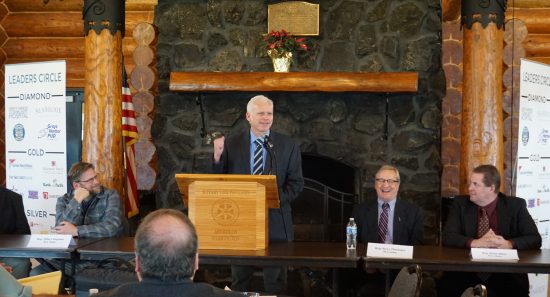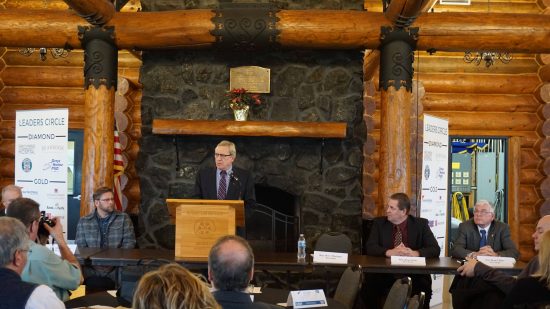
ABERDEEN— Lawmakers from the 19th and 24th District focused on kitchen table issues—transportation, health care, jobs and childcare—during the 2020 Legislative Send-Off.
Transportation
“This session, the big thing will be transportation,” said Sen. Dean Takko (D-Longview), who opened the remarks at the Rotary Log Pavilion by explaining how the passage of Initiative 976 means cuts to state and local transportation services.
His seatmate in the 19th District, Rep. Brian Blake (D-Aberdeen), agreed. “We have to write a budget that reflects the will of the voters,” Blake said. “There will be some pain, but it is doable.”
School funding
Blake and Takko both highlighted the need for a better way to fund schools.
“The school funding formula does not meet the needs of rural school districts,” Blake said.
Jobs
Jobs and rural development were the focus of Rep. Mike Chapman (D-Port Angeles) in his initial remarks.
“I was asked to head up Rural Development for the House Democratic Caucus,” said Chapman, who talked about his legislation to extend the Business & Occupation Tax break for the pulp and paper industry. “Nobody believed that would happen. You know what? We did it. We had a 98-0 vote off the House floor and a generational tax break for a dominant industry here on the coast.”
Takko identified long permitting processes as a barrier to jobs and development, saying it was frustrating to have a business want to come in, or expand, only to go through four, five or six years of permitting without ever getting a final answer.
Cross-Laminated Timber (CLT) could be a big industry, said Rep. Steve Tharinger (D-Port Townsend).
“I put $20 million in the last budget to build single-story classrooms with CLT,” Tharinger said. “Now, we’re going up two or three stories. We can replace fields of portables at schools with multi-story classrooms. It’s a huge need across the state and it would create jobs here in the 19th and 24th districts.”
Sen. Kevin Van De Wege (D-Sequim) said new legislation on carbon sequestration could be a boon to coastal communities.
“Washington state has done a lot of work around carbon,” Van De Wege said. “If we grow trees for 40 or 50 years, harvest them and replant, it’s really good for the environment and it creates jobs.”
Homelessness
When asked about homelessness being the No. 1 issue in a new statewide poll, Tharinger said, “We’re working on a bill right now in Capital Budget to help.”
Tharinger said the legislation will help rural areas qualify for a program—tax market credits—to build affordable housing with a five-to-one funding match. “Five bucks for every dollar you put in,” he said. “But rural areas can’t put together big enough packages to qualify.”
The legislation would let rural parts of the state band together to qualify.
Childcare and health care
Tharinger also highlighted affordable childcare as a top issue, having heard about it a lot during Chapman’s rural development tour.
“Balancing work and childcare is a challenge for families,” Tharinger said, adding that he’s looking at ways to expand access to childcare by streamlining regulations and permits.
As to health care, Tharinger said progress was being made on behavioral health, with almost $120 million in new investments. He also pointed out hundreds of rural hospitals are closing across America.
“We need to figure out a long-term solution for rural hospitals,” Tharinger said.
Wildfires, wildlife and water
Van De Wege said he’d keep pushing legislation to fund wildfire prevention, with forest fires increasing in Washington state, along with a bill reforming the penalties for fish and wildlife offenses. He pointed out people recently convicted in a widespread poaching case could have their hunting rights restored in their lifetime, and the legislation would allow for a lifetime ban.
Blake said he would introduce legislation regarding water, including a drought bill.
“Having good, fresh water for cities and towns is critical,” Blake said. “I just met with Ecology yesterday on a water-banking bill. It’s a finite resource and we’ll have to develop policy to address it.”
Staying in touch despite bad weather
“Don’t worry about nasty weather during session,” Van De Wege said. “If you can’t make it to your appointment with a lawmaker because of snow or flooding, call any of us and we’ll do the meeting over the phone.”

